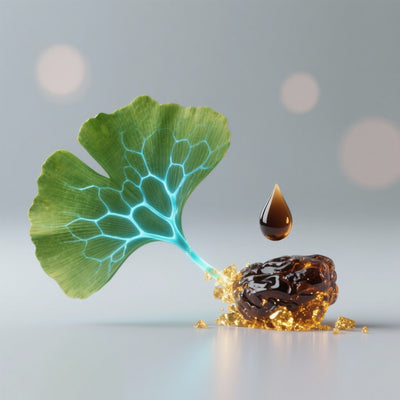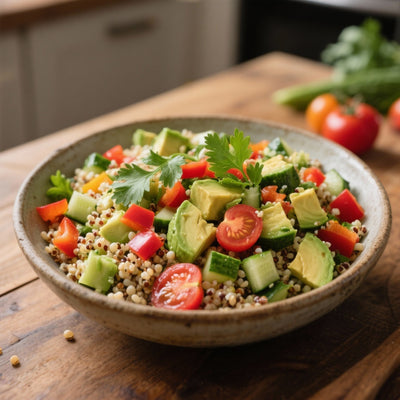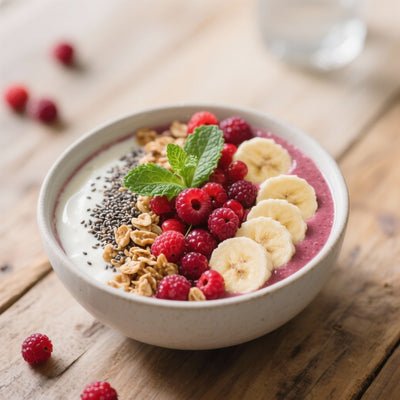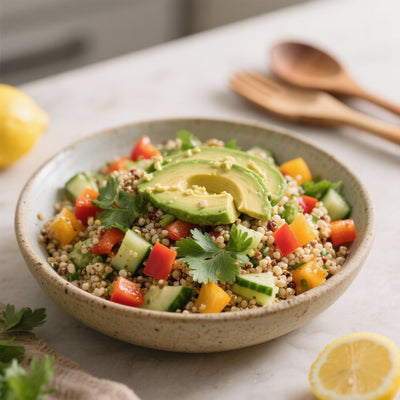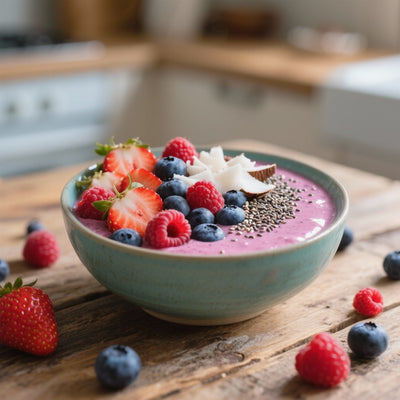How to nourish your skin from within: The complete guide to nutricosmetics
Do you invest in expensive serums and luxurious night creams, but your skin still lacks that elusive glow? You're not alone. The truth is, the most beautiful skin isn't just about surface care. It's about nourishing it from within. This is the fundamental principle of nutricosmetics , a revolutionary approach that considers your diet your number one beauty product. This comprehensive guide will reveal how to transform your plate into your best ally for radiant, healthy, and visibly younger-looking skin.
What is nutricosmetics? Beauty that comes from within.
Nutricosmetics, a portmanteau of "nutrition" and "cosmetics," is the science that studies the impact of nutrients and micronutrients on the health and appearance of skin, hair, and nails. The idea is simple: to correct surface imperfections, you must first address the body's deeper needs. Our skin cells are constantly renewing themselves, and they need the right fuel to do so properly.
Beyond moisturizing cream
A moisturizing cream acts on the uppermost layer of the epidermis, the stratum corneum, to strengthen the skin barrier and limit water loss. This is an essential step, but its effect remains local and temporary. Nutritive cosmetics, on the other hand, act at a cellular level. The nutrients you ingest are transported by the blood to the dermis, the deepest layer of the skin, where collagen and elastin are produced, ensuring its firmness and elasticity.
"Consider your skin like a garden. Creams are the surface watering, but nutricosmetics are the fertilizer that nourishes the soil deep down. Without rich soil, the most beautiful plants cannot flourish."
The Pillars of Nutrition for Radiant Skin
To nourish your skin from within, you need to focus on a few key nutrient groups. Incorporating these pillars into your daily diet is the first step towards a visible transformation.
Antioxidants: Your bodyguards against aging
Our skin is constantly under attack from external factors such as pollution, UV rays, and stress. These aggressions generate free radicals, unstable molecules that damage our cells and accelerate skin aging. Antioxidants neutralize these free radicals, thus protecting your skin's youthfulness.
- Vitamin C: Essential for collagen synthesis, it brightens the complexion. It is found in citrus fruits, kiwis, red peppers, and broccoli.
- Vitamin E: Protects cell membranes from oxidation. Found in almonds, sunflower seeds, avocados, and vegetable oils.
- Carotenoids (Beta-carotene, Lycopene): Give a healthy glow and protect against UV rays. Found in carrots, sweet potatoes, spinach, and tomatoes.
Essential Fatty Acids: The secret to supple and hydrated skin
"Good fats" are crucial for maintaining the skin's hydrolipidic barrier. This barrier protects the epidermis from external aggressors and retains moisture. A deficiency in essential fatty acids often results in dry, sensitive skin prone to inflammation.
- Omega-3: Powerful anti-inflammatories, they soothe redness and irritation. Sources: oily fish (salmon, sardines), flax seeds, chia seeds, walnuts.
- Omega-6: Contributes to the building of the skin barrier. Sources: borage oil, evening primrose oil, walnuts.
Proteins and Collagen: The building blocks of your epidermis
Skin is primarily composed of proteins, the best known of which are collagen (for firmness) and elastin (for elasticity). For your body to produce these, it needs a sufficient supply of amino acids, the building blocks of proteins. A diet rich in high-quality protein is therefore essential for firm, supple skin.
Consider lean meats, eggs, legumes, tofu, and dairy products. Bone broth is also an excellent source of readily absorbable collagen.
Superfoods to Incorporate into Your Routine
Beyond the major food groups, certain micronutrients play a key role in skin health. Make a point of including them in your diet.
Did you know? Dehydration of just 2% can reduce skin elasticity by 15% and accentuate the appearance of fine lines.
Zinc: The trace element that fights imperfections
Zinc is a valuable ally for problem skin. It aids in healing, regulates sebum production, and has anti-inflammatory and antibacterial properties. A zinc deficiency can exacerbate acne and dermatitis. You can find it in oysters, pumpkin seeds, red meat, and lentils.
Selenium: The cell protector
This powerful antioxidant protects skin elasticity and prevents cell damage caused by UV rays. Brazil nuts are the most concentrated source (just one nut can meet your daily needs!), but it is also found in fish and eggs.
Polyphenols: Plant shields
This large family of plant compounds has remarkable antioxidant and anti-inflammatory effects. Resveratrol from grapes, catechins from green tea, and anthocyanins from red berries protect the skin from premature aging and improve microcirculation for a fresher, rosier complexion.
Putting it into practice: Building your "beautiful skin" plate
Theory is good, but practice is better! Here's what a day of food designed to nourish your skin from within could look like.
- Radiance-boosting breakfast: A green smoothie with spinach (vitamins), half an avocado (good fats), red berries (antioxidants), chia seeds (omega-3) and a spoonful of protein powder.
- Anti-inflammatory lunch: A large bowl of quinoa, grilled salmon (omega-3, protein), steamed broccoli (vitamin C), and a drizzle of extra virgin olive oil.
- Smart snack: A handful of almonds (vitamin E) and a square of dark chocolate with more than 70% (polyphenols).
- Restorative dinner: A red lentil soup (zinc, protein) with carrots and sweet potatoes (beta-carotene), accompanied by a slice of wholemeal bread.
Don't forget hydration! Aim for 1.5 to 2 liters of water per day, varying with unsweetened herbal teas and green tea.
Dietary supplements: A boost or a necessity?
A varied and balanced diet remains the foundation. However, in certain situations (stress, fatigue, unbalanced diet), dietary supplements can provide targeted and effective support.
When should supplementation be considered?
If, despite your dietary efforts, your skin remains dry, dull, or prone to blemishes, a course of supplements may be beneficial. It's also an excellent way to target a specific issue, such as loss of firmness or dehydration.
The star ingredients of nutri-cosmetics in capsule form
- Hydrolyzed marine collagen: Studies have shown that supplementation with collagen peptides can improve skin elasticity and hydration.
- Hyaluronic Acid: Capable of retaining up to 1000 times its weight in water, it hydrates the skin from within for a plumping effect.
- Biotin (Vitamin B8): Essential for the health of the skin and hair, nails.
- Antioxidants: Complexes of vitamins C, E, selenium and zinc for comprehensive protection.
Before starting any supplementation, it is recommended to consult a healthcare professional. Always choose high-quality products with well-balanced active ingredients and impeccable traceability. Explore our nutricosmetic solutions to find the support best suited to your needs.
Frequently Asked Questions about Nutri-Cosmetics
How long does it take to see results on the skin?
Patience is key. The skin's cell renewal cycle is approximately 28 days. Therefore, it takes at least one to three months to see significant changes. Consistency is more important than perfection: daily habits are what build lasting results.
Can food really replace my creams?
No, nutricosmetics don't replace topical skincare; they complement it. It's a synergistic approach : external treatments protect the skin barrier from aggressors, while nutrition nourishes and repairs the skin from within. Each enhances the effects of the other for optimal results.
Are there any foods to avoid to have beautiful skin?
Yes, some foods are known to be pro-inflammatory and can worsen certain skin problems. It is advisable to limit your consumption of:
- Refined sugars and high glycemic index foods: They can stimulate inflammation and sebum production.
- Dairy products (for some people): They may be linked to acne in sensitive individuals.
- Trans fats and processed fats: These are found in ultra-processed foods; they promote oxidative stress.



